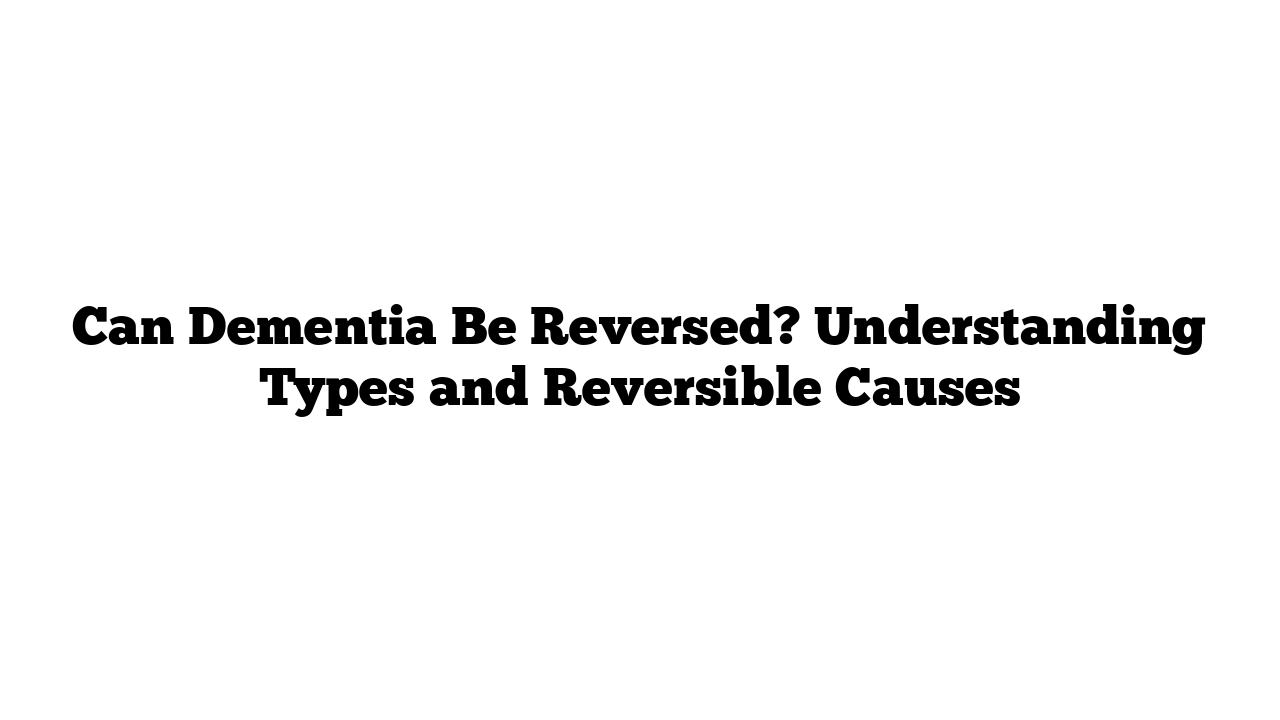When discussing dementia, one of the most common questions asked is: “Is dementia reversible?” To answer this, it’s important to first understand what dementia is and recognize that it’s not a one-size-fits-all condition. Let’s explore the nuances of dementia, including the types that can be treated or even reversed.
What is Dementia?
Dementia is an umbrella term for various conditions that affect thinking, memory, and overall cognitive function. It’s not a specific disease but a broad category that encompasses multiple types of cognitive impairments.
Think of it like the word “fruit.” While apples, oranges, and bananas are all fruits, they are distinct from one another. Similarly, Alzheimer’s disease, Lewy body dementia, vascular dementia, and frontotemporal dementia all fall under the umbrella of dementia, but each type is unique in its cause and progression.
This distinction is crucial when answering whether dementia is reversible.
Progressive Dementias: Not Reversible
Some types of dementia are progressive, meaning they worsen over time and cannot be reversed. According to the Mayo Clinic, these include:
- Alzheimer’s Disease
- Lewy Body Dementia
- Frontotemporal Dementia
- Vascular Dementia
- Dementia Due to Multiple Etiologies (a mix of causes)
These progressive types make up the majority of dementia cases in the United States and worldwide. Unfortunately, while treatments may help manage symptoms temporarily, these conditions have no cure.
Reversible Dementias and Dementia-like Conditions
Here’s the good news: not all dementias are permanent. Several conditions can mimic dementia or cause dementia-like symptoms, and many of these are treatable.
Here are the most common reversible causes of dementia symptoms:
1. Metabolic Problems and Endocrine Disorders
Metabolic imbalances, such as thyroid dysfunction or abnormal blood sugar levels, can lead to cognitive problems. Examples include:
- Hypothyroidism (low thyroid function)
- Hypoglycemia (low blood sugar)
- Abnormal sodium or calcium levels
- Vitamin B12 deficiency
Once these issues are identified and corrected, symptoms can improve significantly.
2. Nutritional Deficiencies
Malnutrition and vitamin deficiencies can cause cognitive impairment. Common culprits include:
- Vitamin B complex deficiencies
- Copper deficiency
- Vitamin E deficiency
Dehydration, especially in older adults, can exacerbate these symptoms. A healthy, nutrient-rich diet is often an effective remedy.
3. Medication Side Effects
Some medications can mimic dementia symptoms. For instance, drugs with anticholinergic properties, like diphenhydramine (found in many over-the-counter sleep aids and allergy medicines), can cause confusion and memory problems.
Always inform healthcare providers about every medication—prescription and over-the-counter—your loved one is taking to rule out drug-induced cognitive impairment.
4. Subdural Hematomas
Brain bleeds, often due to falls, can create pressure that mimics dementia. Treatment to relieve the pressure can restore cognitive function in many cases.
5. Normal Pressure Hydrocephalus (NPH)
NPH occurs when excess cerebrospinal fluid builds up in the brain. Its symptoms, which include confusion, balance issues, and urinary incontinence, can be mistaken for dementia. A surgical procedure to drain the fluid often improves symptoms dramatically.
6. Depression and Mental Health Issues
Depression in older adults can sometimes present as “pseudodementia,” with symptoms like memory loss and confusion. Treating the underlying mental health condition can restore normal cognitive function.
How to Ensure the Right Diagnosis
If your loved one is showing signs of dementia, it’s essential to work with healthcare providers to rule out reversible causes. Comprehensive testing often includes:
- Blood tests to check for metabolic and nutritional deficiencies.
- Brain imaging (MRI or CT scans) to identify structural changes or bleeds.
- A thorough medication review.
Pro Tip: Always advocate for a second opinion if the diagnosis feels incomplete.
Can Cognitive Function Improve?
Even if your loved one has a progressive form of dementia, addressing reversible conditions can enhance overall cognitive function. For instance:
- Treating a thyroid problem in someone with Alzheimer’s may lead to noticeable improvements in memory and focus.
- Managing dehydration or malnutrition can boost energy levels and clarity.
It’s about improving quality of life, even when a full cure isn’t possible.
Final Thoughts: Hope for Better Outcomes
While the term “dementia” often feels overwhelming, it’s essential to remember that not all forms are permanent or untreatable. With the right medical care, many conditions can be improved, and even progressive dementias can benefit from early intervention and symptom management.
Stay informed and proactive. If you suspect dementia-like symptoms, consult a healthcare professional and visit trustworthy resources like medicaltimes.io for the latest updates on dementia care and research.
Frequently Asked Questions (FAQs)
1. Can dementia symptoms go away?
Yes, if caused by reversible conditions like vitamin deficiencies, thyroid problems, or certain medications.
2. What is pseudodementia?
It’s a condition where depression mimics dementia symptoms. Treating the depression often resolves cognitive issues.
3. How can I prevent progressive dementias?
Healthy lifestyle choices, such as regular exercise, a balanced diet, and managing vascular risk factors, can help reduce the risk.
4. Are memory problems always dementia?
No, memory issues can stem from stress, sleep deprivation, or medications. A thorough evaluation is necessary.
5. What tests diagnose reversible dementia?
Blood tests, brain imaging, and a detailed medical history help identify reversible causes.
6. Can hydration affect dementia symptoms?
Yes, dehydration can mimic dementia-like symptoms. Ensure proper hydration, especially in older adults.
7. Are there early signs of dementia?
Early signs include memory lapses, confusion, and difficulty completing familiar tasks.
8. How do I talk to a doctor about dementia concerns?
Be specific about observed symptoms, their frequency, and any recent health changes or medication use.
9. Can progressive dementias improve temporarily?
Yes, addressing coexisting issues like infections or metabolic problems can improve overall function.
10. Is dementia always age-related?
No, while age is a risk factor, young-onset dementia can occur in people under 65.
